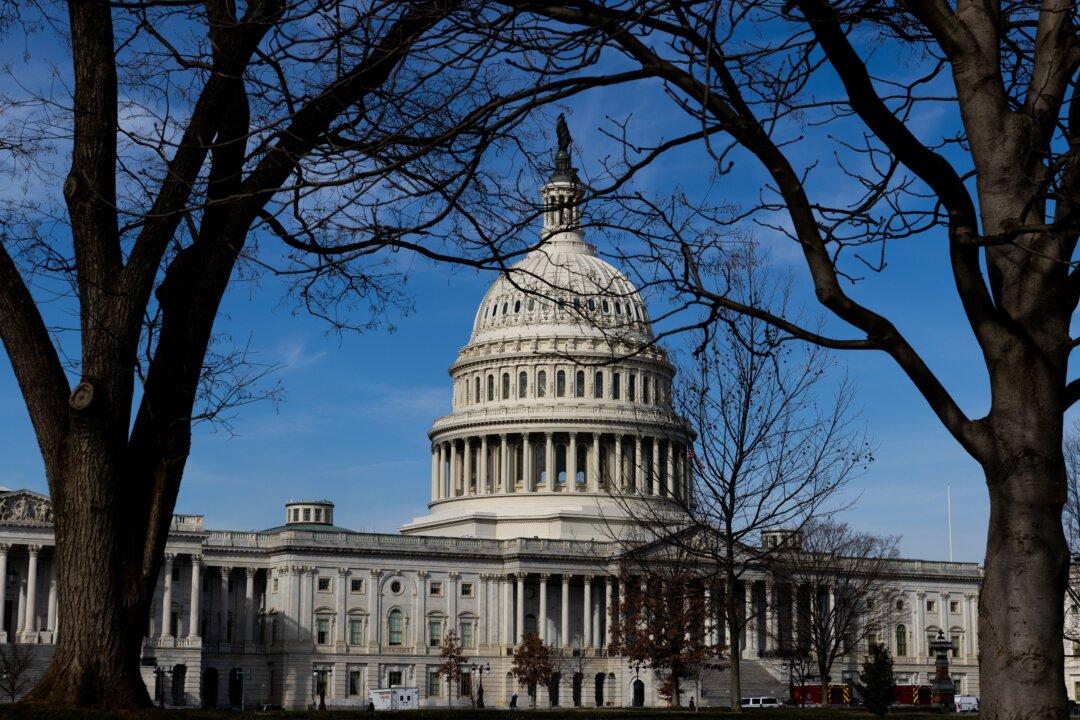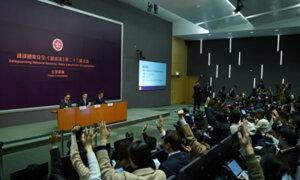The Congressional-Executive Commission on China (CECC) has called on Secretary of State Antony Blinken to alert Americans of the potential risks they may face in Hong Kong as the city is expected to pass Article 23, also known as Hong Kong’s new national security law, this week.
The three-page letter sent to the secretary of state on March 14 was co-signed by CECC Chairman Rep. Chris Smith (R- N.J.) and Co-Chair Sen. Jeff Merkley (D-Ore.) and House Select Committee on the Chinese Communist Party Chairman Rep. Mike Gallagher (R-Wis.) and Ranking Member Rep. Raja Krishnamoorthi (D-Ill.).
“Hong Kong was once a bastion of freedom, with its vitality and prosperity undergirded by the rule of law and democratic freedoms guaranteed by the Sino–British Joint Declaration and the territory’s de facto Constitution, the Basic Law,” the letter reads. “Sadly, this Hong Kong no longer exists. The Hong Kong government’s pursuit of the Article 23 legislation confirms this tragic fact.”
The four legislators held that an ever-expanding notion of national security would only “make Hong Kong less safe for U.S. businesses and citizens living in Hong Kong as well as Hong Kongers seeking to exercise their fundamental freedoms.”
They pointed out that after the “aggressive implementation” of the Hong Kong national security law, more than 1,000 Hong Kongers have been in custody for peaceful political activism.
“Hong Kong now detains political prisoners at a rate only surpassed by a handful of authoritarian countries, such as Belarus, Burma, and Cuba,” they wrote.
Referring to the large-scale protest in 2003 when Article 23 was planned to be enacted, the letter pointed out that little opposition was left this time to protest the reintroduction of the legislation.
Concerns Over ‘Extraterritorial Application’
The lawmakers argued that the draft’s broad definitions of “state secret” and “external interference” would allow “virtually anything” that Beijing or the Hong Kong authorities find “politically offensive” to be prosecuted under the Article 23 legislation.“In addition to expanding the list of punishable offenses, the HKNSL [Hong Kong National Security Law of 2020] curtailed the due process rights of criminal defendants, affecting procedures such as pretrial release, trial by jury, and representation by legal counsel of one’s choosing,” they wrote, noting that the legislation’s emphasis of “law enforcement expediency” suggests an expansion of the police’s investigative powers and will further subordinate procedural safeguards for defendants.
The Article 23 consultation document’s explicit call for the proposed offenses’ “extraterritorial application” is particularly concerning.
“Given the zealous implementation of the HKNSL by the Hong Kong government and the further human rights abuses that will likely occur with the passage of Article 23 legislation, the best course of action for the Hong Kong government would be to withdraw the draft law completely and repeal the HKNSL.
Lawmakers: Sanction HK Officials, Strip Diplomatic Privileges
In light of the above concerns, the four lawmakers urged Mr. Blinken to take additional steps to protect U.S. citizens, businesses, and other U.S. interests in Hong Kong by upholding international law and treaties.“The State Department should thoroughly re-evaluate business and travel advisories to inform the American public of the risks presented by the PRC and Hong Kong governments. If Article 23 legislation is to pass, which we expect it will, a Level 2 travel advisory for Hong Kong may no longer be defensible,” their letter reads.
They further noted that the United States hasn’t sanctioned any official of Hong Kong since August 2020.
“As we await the sentencing of Jimmy Lai and the trial of the Hong Kong 47, it is time for the Administration to use the authorities available under the Hong Kong Human Rights and Democracy Act and the Hong Kong Autonomy Act to consider sanctions against those Hong Kong government officials who have played an instrumental role in carrying out Beijing’s bidding to undermine democratic freedoms and the rule of law in Hong Kong,” they wrote.
The four lawmakers also urged Mr. Blinken to address the transnational repression experienced by Hong Kongers on U.S. soil and to consider stripping the diplomatic privileges and immunities from the three Hong Kong Economic and Trade Offices operating in the United States, citing that the offices have become Beijing’s propaganda arms.
“To give the Administration additional authorities to act in these areas, we will work with our colleagues in the Congress to pass the Transnational Repression Policy Act and the Hong Kong Economic and Trade Office Certification Act,“ they wrote. ”These are common sense and bipartisan bills that have languished for too long.”






